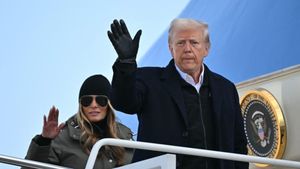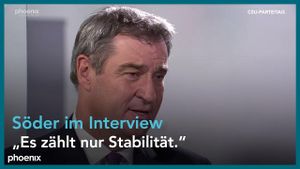Federal Funding Freeze Hits Medicaid Systems Nationwide
States scramble to address confusion and concern over halted federal aid
On January 28, the fallout from the Trump administration's abrupt freeze on federal funding left states across the U.S. grappling with uncertainty and chaos, particularly affecting Medicaid systems. The situation raised alarm as various state agencies and healthcare providers reported disrupted access to key services.
The White House memo, released late on January 27 by the Office of Management and Budget (OMB), directed agencies to pause distribution of federal grants and financial aid, ostensibly to review their usage under the President's directives. Governor JB Pritzker of Illinois called the move inappropriate and unconstitutional. “The United States Constitution clearly states Congress has the power of the purse and sets laws to obligate federal funding for all 50 states,” said Pritzker. “What Donald Trump tried to do... is illegal.”
Despite initial attempts by the White House to clarify which programs were affected, confusion reigned. White House Press Secretary Karoline Leavitt confirmed during her first press briefing services like Social Security and Medicare would not be impacted, yet she did not specify the status of Medicaid funding. This lack of clarity raised eyebrows as states began reporting outages of Medicaid reimbursement portals last Tuesday.
Pritzker expressed fears about the potential ramifications for Illinois residents, many of whom depend on Medicaid for healthcare, alongside programs supporting small businesses and nonprofits. “This is a demonstration of cruelty against people who depend on us,” he stated, highlighting the plight of over 3.5 million residents who rely on Medicaid for their health insurance.
On the same day, Governor Pritzker and other Democratic state attorneys general announced plans to file lawsuits against the federal directive, asserting its unlawfulness. Attorney General Kwame Raoul emphasized, “We will collectively fight this unconstitutional mandate.” The importance of federal aid cannot be overstated; it supports educational programs, public health services, and maintenance of infrastructure.
While some systems faced temporary shutdowns, the OMB sought to clarify later on, with Leavitt acknowledging via social media the reimbursement portals for Medicaid would be “back online shortly.” The contradictory messaging created additional challenges for state officials attempting to plan for potential disruptions to services and funding.
To compound the confusion, federal district judge Loren L. AliKhan issued ruling moments before the freeze was to take effect, temporarily blocking Trump's directive on federal grants and loans. Many observers hoped this would ease the uncertainty enveloping federally funded programs. Specifically, AliKhan's ruling underscored concerns about the impact on nonprofit organizations and public services, which rely heavily on these funds. “There is widespread confusion over the last week among Americans and organizations,” AliKhan remarked.
The back-and-forth between states and the federal government over the status of Medicaid and federal funding reflects broader tensions surrounding public funding and responsibility. At stake are trillions of dollars aimed at supporting programs indispensable for millions of Americans, particularly the most vulnerable populations.
Historically, Medicaid has played an instrumental role in providing health coverage to low-income populations. Approximately 52% of Medicaid costs are funded by the federal government, which means disruptions could severely impact healthcare access and costs for many individuals. Reports indicated some states had briefly lost access to their Medicaid systems entirely on January 28 as confusion grew.
According to reports, the Illinois state government alone received about $20.4 billion from federal sources halfway through the current fiscal year, with Medicaid being one of the largest funding categories for health services. The potential for temporary freezes and funding cuts from Washington sends tremors through state fiscal policies, leaving governors and state lawmakers scrambling to prepare for contingencies.
While the White House memo was eventually rescinded, administration officials maintained the core directive on executive orders impacting spending practices remained intact. Leavitt sought to clarify the duality of the communications, affirming, “This is NOT a rescission of the federal funding freeze.” Hence, the executive orders prioritizing certain federal spending areas—such as foreign aid and diversity programs—remain active.
Judicial intervention may have temporarily halted the freeze, but the ramifications of the Trump administration’s approach to federal funding continue to loom large over state budgets and public services. With each piece of communication from the administration either denouncing or momentarily abrogated, it remains unclear how federal money flows will be managed moving forward.
State responses reflect broader national concerns over government accountability and the looming threats to federally supported programs. Yet the tumult may prove beneficial for advocates pressing for equitable access and continued support for programs like Medicaid. For legislators considering budget plans, balancing the unknowns of federal support will surely shape the policy direction for millions of Americans reliant on the services impacted by this federal funding freeze.



